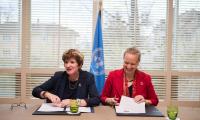The institute strengthens its cooperation with OHCHR

Today, the Danish Institute for Human Rights signs a Memorandum of Understanding (MoU) with the Office of the United Nations High Commissioner for Human Rights (OHCHR). The purpose of the agreement is for the institutions to further operationalise the synergies between human rights and sustainable development in their work.
“Together with the Office of the United Nations High Commissioner for Human Rights, we can position human rights as a key instrument in securing accountability in the implementation and follow-up of the 2030 Agenda for Sustainable Development,” says Eva Grambye, Deputy Executive Director of the Danish Institute for Human Rights.
“As Socrates said 'Let him that would move the world first move himself'. The SDGs are a promise to move the world for the better. The first step is to move ourselves, all of us – to get moving for rights– sustained, fair and equal,” says UN Deputy High Commissioner for Human Rights Kate Gilmore.
Some of the concrete areas of collaboration will be:
- Tools and training on a human rights-based approach to the 2030 Agenda, including training of UN country teams.
- Extracting data from the human rights system to guide and uphold accountability in the implementation, follow-up and review of the 2030 Agenda.
- Build capacity of National Statistical Offices and National Human Rights Institutions to ensure that no one is left behind in the measurement of the 2030 Agenda.
The United Nations High Commissioner for Human Rights is the principal human rights official of the United Nations and has a unique mandate from the international community to promote and protect all human rights.
The High Commissioner heads the Office of the United Nations High Commissioner for Human Rights (OHCHR) and spearheads the United Nations' human rights efforts.
Read more about OHCHR here.
Since the adoption of the 2030 Agenda for Sustainable Development and the Sustainable Development Goals (SDGs), the institute has systematically analysed the human rights potential of the SDGs. In addition, the institute has developed tools to promote a human rights-based approach to the implementation, follow-up and review of the SDGs.
”It is my hope that the strong engagement, specific mandate and legitimacy that OHCHR holds in countries around the world, along with our tools for and expertise in linking human rights and sustainable development, will assist countries in making sustainable development possible,” says Eva Grambye.
The Memorandum of Understanding will be signed in Geneva by Deputy Executive Director Eva Grambye and the UN Deputy High Commissioner for Human Rights Kate Gilmore.
The 2030 Agenda for Sustainable Development and the 17 Sustainable Development Goals (SDGs) were adopted by the UN member states in September 2015. The SDGs aim to ensure that countries across the globe, over the next fifteen years, will end all forms of poverty, fight inequalities and tackle climate change.
The SDGs reflect a global political commitment, which along with human rights obligations constitute a coherent framework for action. Countries have the primary responsibility for follow-up and review of the progress made in implementing the goals.
Read more about the Institute’s work on human rights and the 2030 Agenda here.
